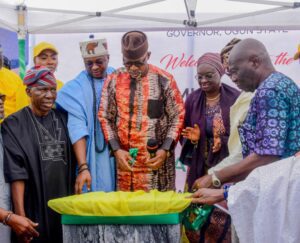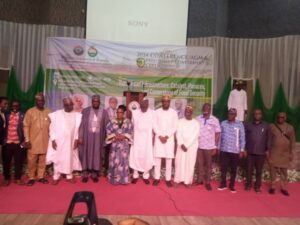
WHO to partner NDDC on health programmes in Niger Delta
The World Health Organisation (WHO) has stated its willingness to partner the Niger Delta Development Commission (NDDC) to execute a Health Insurance Project, as well as other health programmes that will benefit the people of the Niger Delta region.
This was affirmed by the NDDC Managing Director, Dr. Samuel Ogbuku, during an interview with journalists at the Commission’s headquarters in Port Harcourt. He said that the Commission recently held a meeting with WHO officials, where it made a presentation on a Health Insurance Project for the Niger Delta region.
Ogbuku said, “The World Health Organisation is discussing with us on our health programmes. In fact, they have written to us, saying that they want more meetings to explore collaborations in the execution of our free healthcare programme. They want to add professionalism and credibility to what we are doing.
“The participation of WHO in our medical outreach programme will ensure that those vaccines that we don’t have access to, are procured through them for the benefit of our people.
“We are not only looking at what they will bring to us in terms of funding, we are looking at their contacts, reach and expertise in the medical field.”
The Managing Director said that NDDC was also discussing with the United States Agency for International Development, USAID, in the areas of youth development and rebuilding public trust to enhance service delivery in the Niger Delta region.
Speaking on collaborations with other organisations, Ogbuku noted that the NDDC had made significant gains since it embraced Public-Private Partnership, PPP, as a major policy thrust.
He remarked, “Partnership is one of the major ways to achieve sustainable development in the Niger Delta region and it is important that NDDC, as the driver of development in the region, stays at the forefront of building the right partnerships.”
The NDDC boss said that the PPP arrangement went beyond collaborations with International Oil Companies, IOCs, as it extends to other critical sectors such as health, education and youth development.
Ogbuku stated, “In some areas, we are seeking technical assistance, not necessarily money. I can assure you that the PPP programme is gaining momentum and it is also gaining the interest of a lot of people.
“We are currently looking for technical support in the area of training for our staff, because we need properly trained staff that will be able to lead most of our programmes and they need to be updated on a regular basis.
“Some of these collaborations, especially the ones from the private sector, need to be studied carefully, because we can’t afford to mortgage the interest of our people. We are not just working for ourselves; we are representing the people of the Niger Delta and we must ensure that the right decisions are made.”
Ogbuku said that there had been positive fall-outs from the partnership arrangements, citing the recently signed Memorandum of Understanding, MoU, between the NDDC and the Nigeria Liquified Natural Gas Limited, NLNG, to collaborate on diverse fronts in the delivery of sustainable development projects.
Reacting to concerns about the approach of the current NDDC Board to the policies introduced before their inauguration, Ogbuku said that the board members were happy with the initiatives and had keyed into them.
He said, “We have had opportunities to interact with members of the Board, especially the Chairman, and they were convinced of the need for the programmes. In some cases, they asked for details of the key programmes.
“In our last board meeting, our consultant on Holistic Opportunity Projects of Engagement, HOPE, made a presentation and the board members were impressed. They have also requested that we have a meeting with KPMG to also make a presentation on the progress in producing a Standard Operating Procedure, SOP, to cover all aspects of the Commission’s activities and transactions.”
Ogbuku expressed satisfaction with the synergy between the Board and Management, attributing it to the experience and knowledge of the Board Chairman, Mr. Chiedu Ebie.
“The Chairman has a rich administrative background in both public and private sectors,” he said.
He declared, “Certainly, we will achieve more together as Management and Board, because if there is one thing we must do, it is to work together to bring development to the people of the Niger Delta region.”



